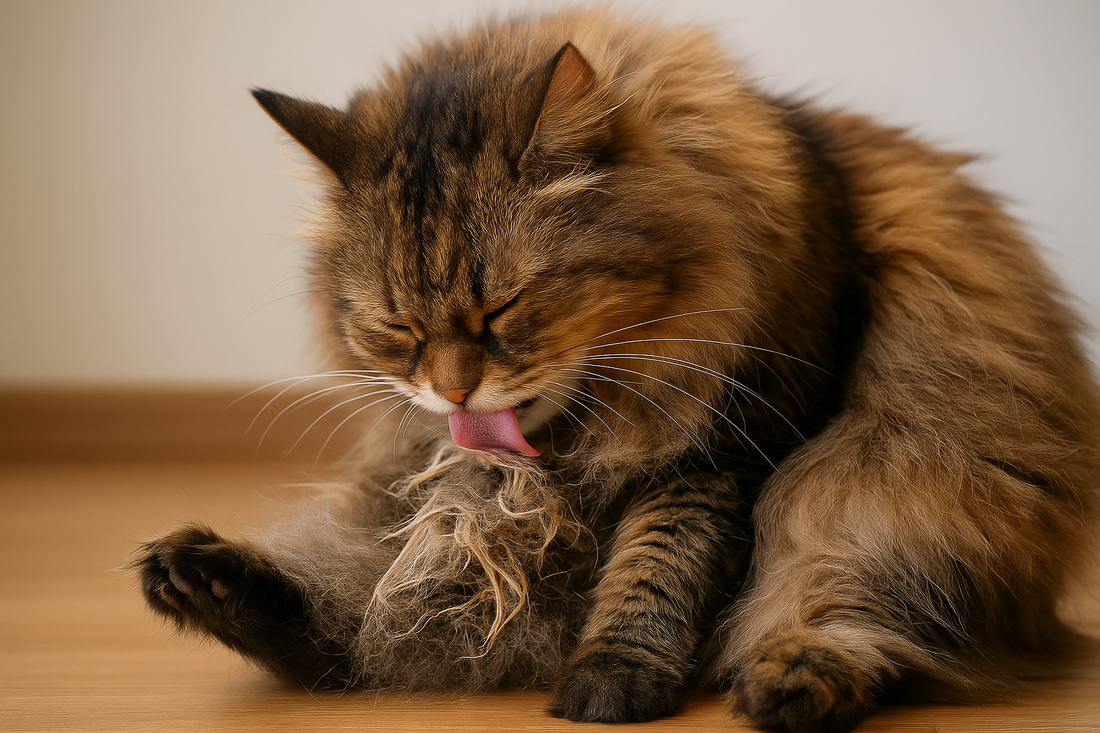
Why My Cat Can't Groom Itself: Understanding the Causes and Solutions
Share
Why Is My Cat Not Grooming Itself?
Cats are known for their meticulous grooming habits, often spending a significant portion of their day cleaning themselves. If your cat has stopped grooming, it could be due to various reasons, including health issues, obesity, dental problems, or stress.
Common Reasons Cats Stop Grooming
-
Health Issues: Illnesses or pain can make grooming uncomfortable or exhausting for cats. Conditions like arthritis or injuries can limit their mobility, making it hard to reach certain areas.
-
Obesity: Overweight cats may struggle to reach parts of their body, leading to unkempt fur and hygiene issues.
-
Dental Problems: Oral pain from dental disease can deter cats from grooming, as licking becomes painful.
-
Stress or Behavioral Changes: Changes in the environment, new pets, or other stressors can affect a cat's grooming habits. Some cats may over-groom, while others may stop grooming altogether.
How to Help Your Cat Groom
-
Regular Brushing: Assist your cat by brushing its fur to remove loose hair and prevent matting. This is especially important for long-haired breeds.
-
Use Grooming Aids: Products like grooming powders can help keep your cat's coat clean between baths, especially if they dislike water.
-
Maintain a Healthy Weight: Ensure your cat has a balanced diet and regular exercise to prevent obesity-related grooming issues.
-
Regular Vet Check-ups: Routine veterinary visits can help identify and address underlying health problems affecting grooming.
When to Consult a Professional Groomer
If your cat continues to neglect grooming despite your efforts, it may be time to consult a professional groomer. They can provide services like bathing, trimming, and addressing matting issues that may be difficult to manage at home.
Conclusion
A cat's grooming habits are a strong reflection of their overall health and emotional well-being. If you’re wondering, “Why my cat can't groom itself?”, you’re already doing the right thing by paying attention. Whether the cause is pain, obesity, dental issues, or stress, it's important to step in with gentle support.
One simple and effective way to help is by using a cat-safe grooming powder like our Skin & Coat Grooming Powder. This dry shampoo alternative is designed to keep your cat’s fur clean, soft, and smelling fresh—especially when they’re unable to do it themselves. It helps reduce shedding, prevent matting, and soothe the skin without water or harsh chemicals. It’s the perfect way to bridge the gap between full grooming sessions and vet visits, while also creating a bonding moment between you and your cat.
And remember—nothing replaces the trained eye of a professional. If your cat has stopped grooming entirely or has a severely matted coat, always consult your vet or visit a certified cat groomer.
FAQs
Q1: Can stress cause my cat to stop grooming?
Yes, stress can lead to changes in grooming behavior. Some cats may over-groom, while others may stop grooming altogether.
Q2: How often should I brush my cat?
It's recommended to brush your cat at least once a week, but long-haired breeds may require daily brushing.
Q3: Are grooming powders safe for cats?
Grooming powders designed specifically for cats are generally safe. Always follow the manufacturer's instructions and consult your vet if unsure.
Q4: What signs indicate my cat has dental problems?
Bad breath, drooling, difficulty eating, and reluctance to groom can be signs of dental issues.
Q5: Should I bathe my cat regularly?
Most cats do not require frequent baths. However, if your cat is unable to groom itself, occasional baths may be necessary. Always use cat-specific shampoos and consult your vet for guidance.




